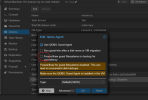in my case It also happened to me with cpanel + cloudlinux,
but some cpanel + cloudlinux work and another no, some crash in one day and some fail in random day's, don't care if i'm using pbs, nfs, local disk, crash some internally is the disventage of mantain very old kernel and try to patch
additionally this in some cases i remember that this occurs in machines without cloudlinux, but with centos7 + cpanel, which means that an old kernel was used too, but in newer ubuntu + cpanel for me is working well i don't no if this is failing in centos8 / alma linux based systems
For me fails also with centos/alma 8


